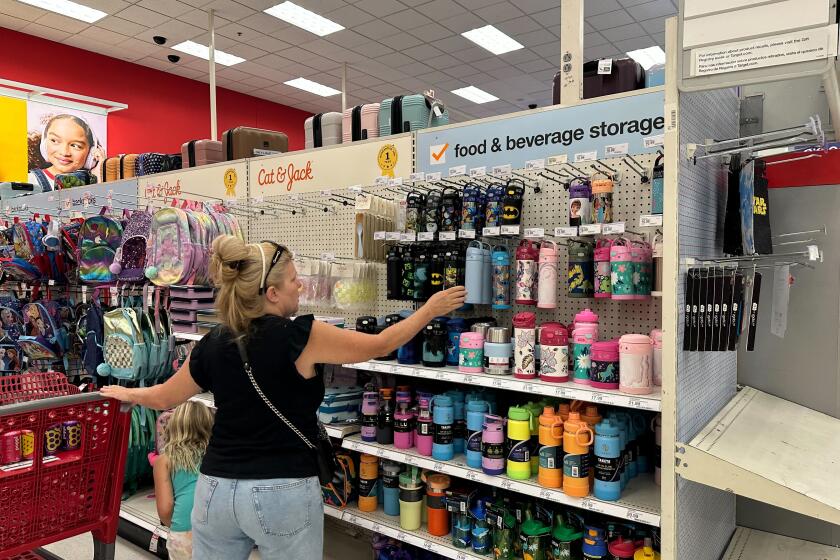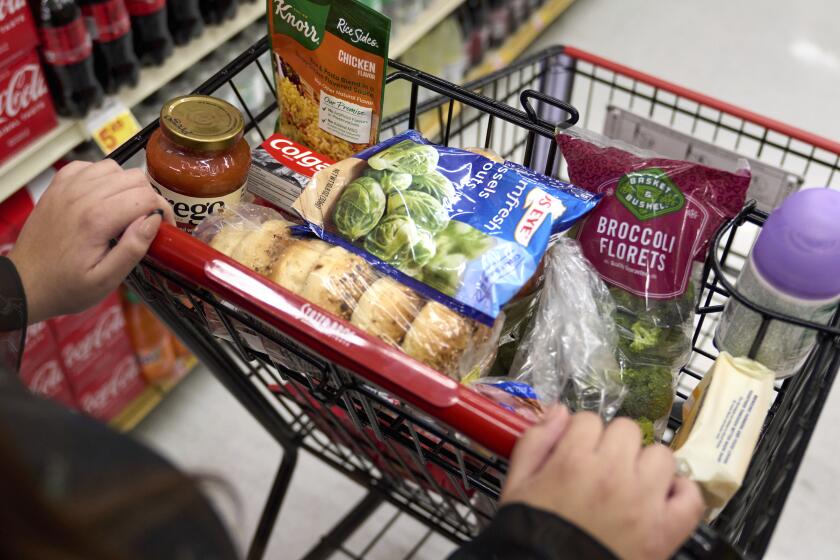Higher gas prices lift Fed’s preferred inflation gauge but underlying price pressures remain mild

- Share via
An inflation gauge closely tracked by the Federal Reserve rose in August, boosted mainly by higher gas prices. But measures of underlying inflation slowed in the latest sign that overall price pressures are still moderating.
Friday’s report from the Commerce Department showed that prices rose 0.4% from July to August, up from just 0.2% the previous month.
Compared with a year earlier, prices rose 3.5% in August, slightly higher than the 3.4% year-over-year increase in July. It was the second straight rise in the year-over-year figure, which has tumbled from its 7% peak in June 2022 but still exceeds the Fed’s 2% inflation target.
A sharp increase in gas costs drove the August price increase, just as it did in the more widely followed consumer price inflation figures that the government issued earlier this month.
But excluding the volatile food and gas categories, “core” inflation rose by the smallest amount in almost two years in August, evidence that it’s continuing to cool. Fed officials pay particular attention to core prices, which are considered a better gauge of where inflation might be headed.
As back-to-school shopping is forecast to reach a record $41.5 billion this year, parents and teachers in L.A. debate what’s essential on their lists — and get creative to make ends meet.
Core prices rose just 0.1% from July to August, down from July’s 0.2%. It was the smallest monthly increase since November 2021.
Compared with a year ago, core prices were up 3.9%, below July’s reading of 4.2%. That, too, was the slowest such increase in two years.
In the meantime, while Americans kept spending in August, they did so at a much more modest pace. Friday’s government report showed that consumer spending, adjusted for inflation, ticked up just 0.1% after having risen 0.6% in July.
“Overall, spending remains positive and inflation is slowing, which will be welcome news to policymakers,” Rubeela Farooqi, chief U.S. economist at High Frequency Economics, said in a note to clients.
The latest data will likely bolster hopes among Fed officials that they will be able to bring inflation back to their target without driving up unemployment or causing a deep recession as many economists have feared. When the Fed released its quarterly economic forecasts last week, it showed that the central bank’s policymakers envision only a small rise in unemployment by the end of 2024: They expect joblessness to rise from its current 3.8% to a still-low 4.1%, along with a gradual drop in core inflation to just 2.6%.
Consumers are switching grocery stores, brands and ingredients as they try to cope with the cost of food.
Still, threats to a so-called “soft landing” — in which inflation would fall back to the Fed’s 2% target without a deep recession — have been growing. Congress is on track to shut down parts of the government by this weekend because a group of hard-right House Republicans have blocked a spending agreement.
How much a shutdown would weaken the economy would depend on how long it lasts. A short closure probably won’t have much impact on the economy. But it would likely have a more far-reaching impact than previous shutdowns did because a larger portion of the government will close.
In earlier shutdowns, for example, legislation had been approved to pay members of the military. That hasn’t happened this time, which would leave upwards of a million service members without paychecks.
And in October, millions of people will have to restart student loan payments, reducing their ability to spend on other items. At the same time, long-term interest rates keep rising, which will likely further swell the cost of mortgages, auto loans and business borrowing. The interest rate on the 10-year Treasury note, a benchmark rate for mortgages, has reached nearly 4.6%, close to its highest level in 16 years.
Higher gas prices are also eating up a bigger share of Americans’ paychecks, with the average national price for a gallon of gas hitting $3.84 on Thursday, up seven cents from a year ago.
Americans increased their purchases at retailers last month in a sign that solid consumer spending is still powering a resilient U.S. economy.
On Thursday, Austan Goolsbee, president of the Federal Reserve Bank of Chicago, expressed optimism that what he called the “golden path” — lower inflation without a recession — was still possible.
“The Fed,” Goolsbee said, “has the chance to achieve something quite rare in the history of central banks — to defeat inflation without tanking the economy. If we succeed, the golden path will be studied for years. If we fail, it will also be studied for years. But let’s aim to succeed.”
More to Read
Inside the business of entertainment
The Wide Shot brings you news, analysis and insights on everything from streaming wars to production — and what it all means for the future.
You may occasionally receive promotional content from the Los Angeles Times.












